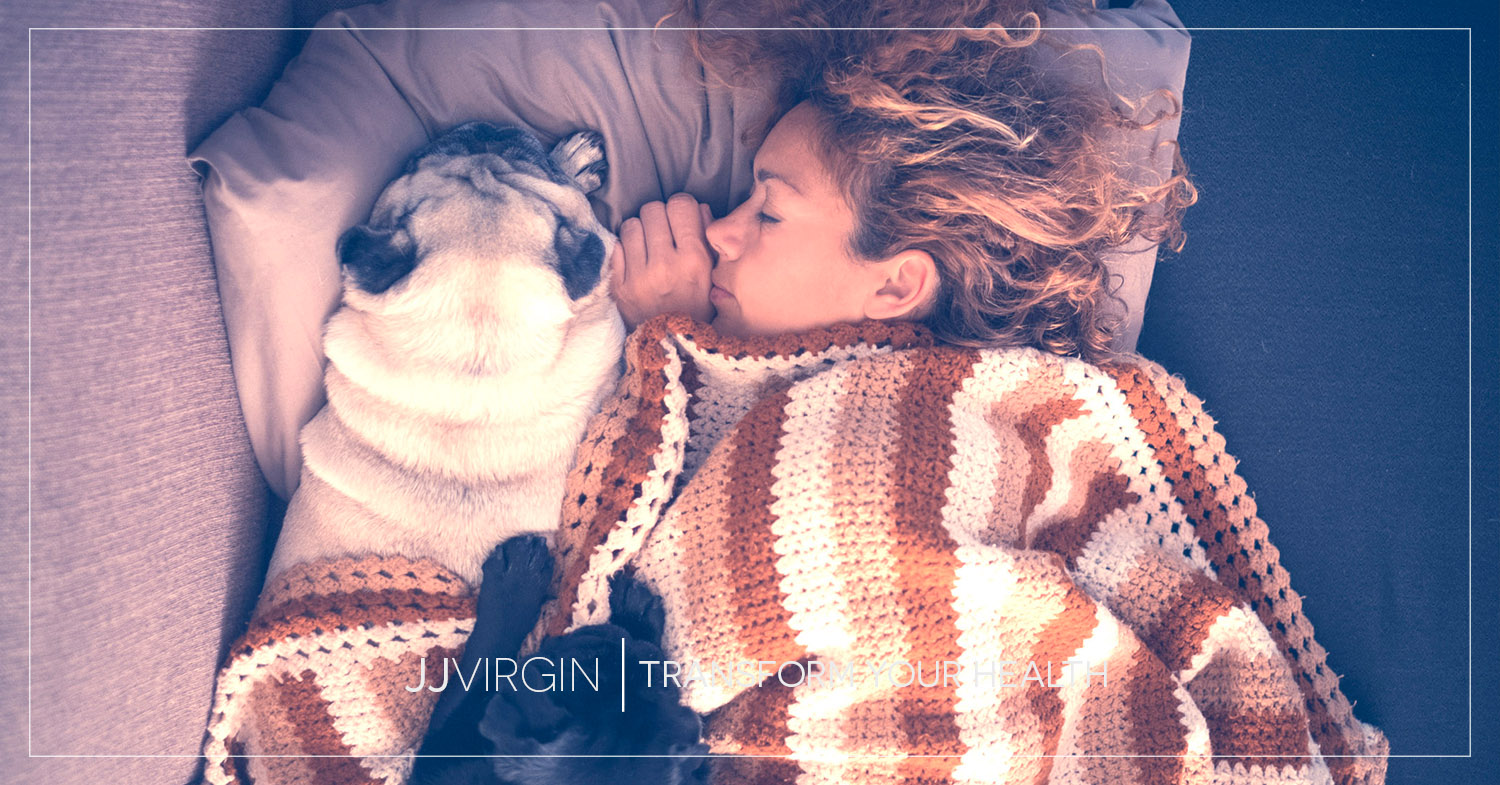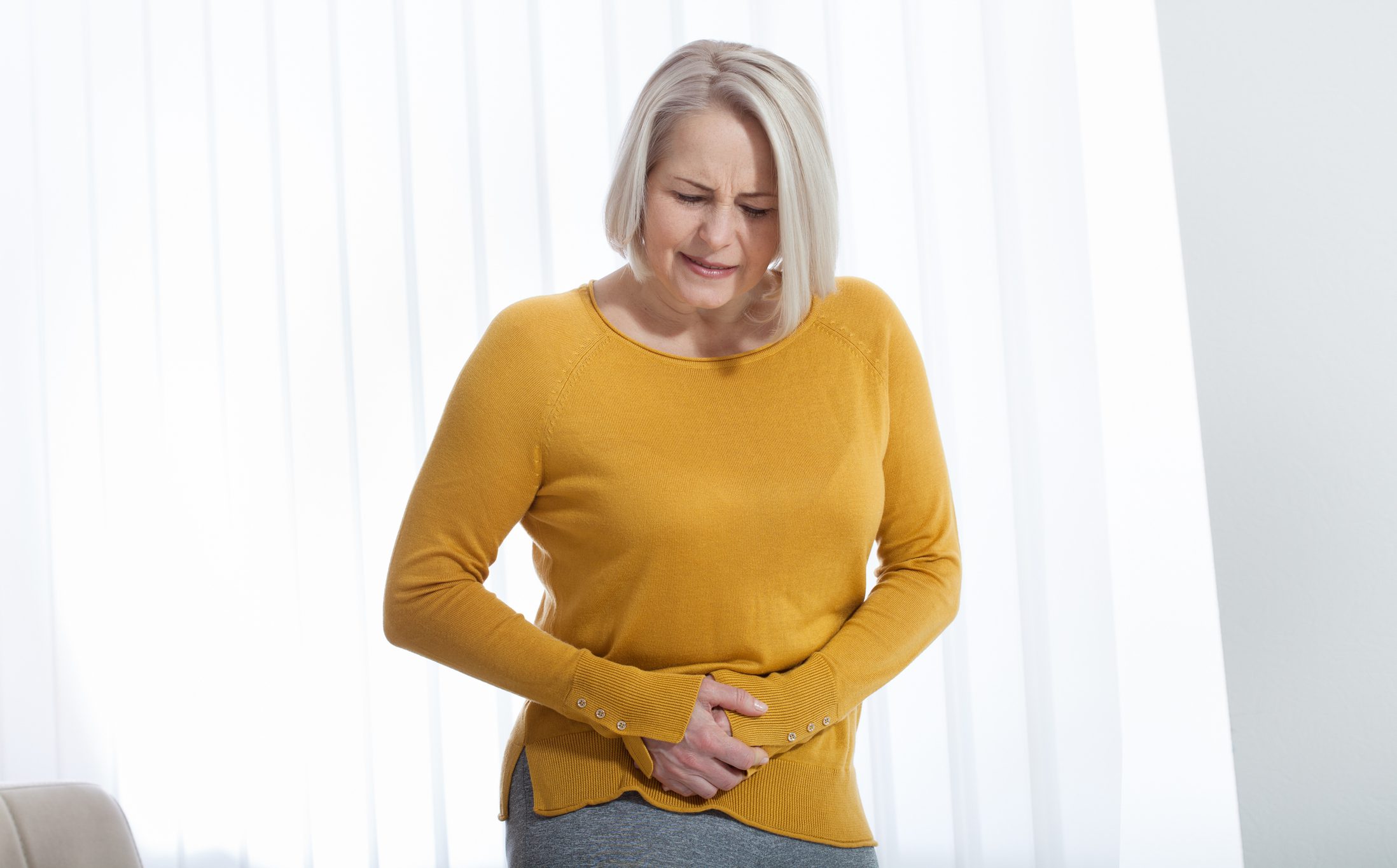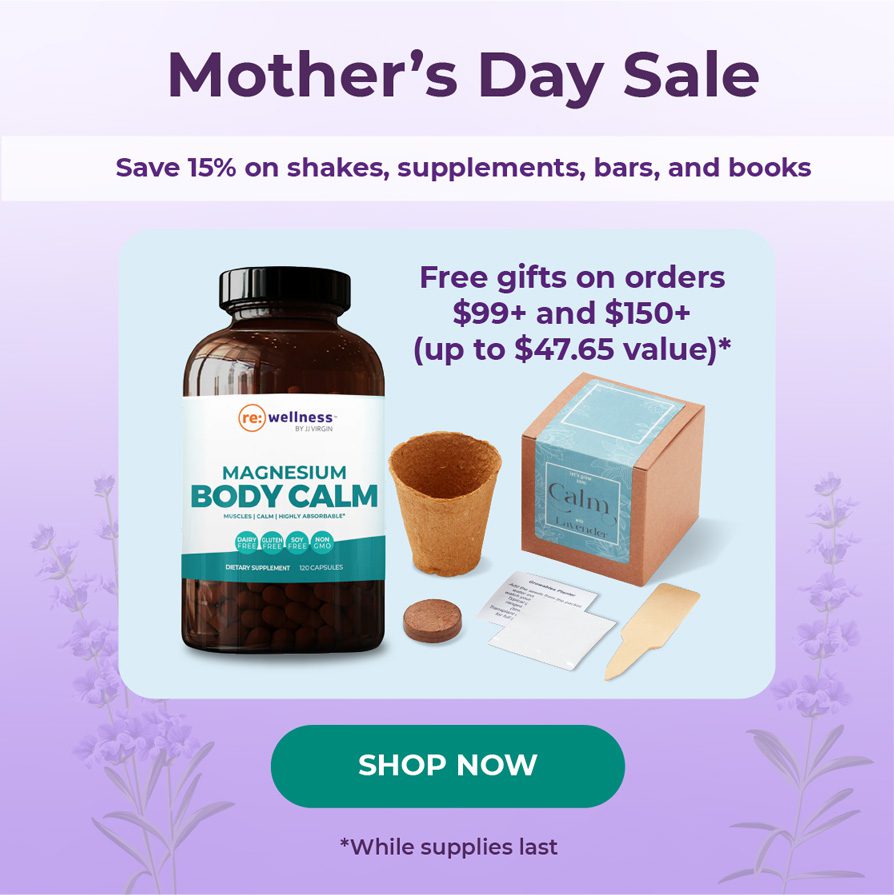Want to have a healthy immune system, reduce inflammation, heal your gut, and be the best fat burner? You've got to get a great night's sleep!
Nothing is more frustrating than being ready to fall asleep, only to find that sleep isn't ready for you.
We all know what it's like to experience that sinking feeling as you lay in bed awake, watching the minutes slowly tick away into hours. Even worse is when you nod off just fine, only to find your eyes wide open at 3 am for no apparent reason!
No wonder our sleep habits have suffered.
Our cellphones have become extensions of our hands, and work-life balance is a unicorn—often talked about, seldom seen. Our schedules are more hectic than ever before, and eating right is a lot to ask as we run between the office, errands, school, and the gym.
In fact, about one in four Americans experience insomnia. One in 10 report it on a chronic basis.
That's bad news because lack of sleep can impair your ability to make decisions and negatively affect work performance. Subpar sleep can also increase the risk of obesity and serious health issues like type 2 diabetes, high blood pressure, and heart disease.1,2
It’s time to say goodbye to sleepless nights! Your weight and your health depend on it.
Here are the top five reasons you may be having trouble falling and staying asleep, plus easy fixes that can get your nights back on track…
1) Blood-Sugar Fluctuations
If you're eating low-carb or enjoy a glass of wine to wind down, this one's for you.
That’s because having wine at bedtime or not eating enough carbs at dinner can cause blood sugar dips and spikes that leave you wide awake at 2 or 3 AM.
Here’s how it works: if your blood sugar drops too low because of a spike and crash from that glass of cabernet or skipping complex carbs at dinner, your body releases stress hormones to bring your blood glucose back up.
Your system is trying to save you from what it perceives as a dangerous situation! But that surge of stress hormones can also suddenly wake you from a deep slumber in the middle of the night.
What’s the solution? For one, be sure to get some slow-low carbs in your final meal of the day. Some of my favorite options are lentils, wild rice, and butternut squash. Check out this blog for more slow-low carb options to add to your dinner plate…
And if you’re going to sip some wine in the evening, be sure to drink your last glass at least 3 hours before bed. Also, opt for low-sugar red wine whenever possible, since it typically has a lower sugar content.
2) Hormonal Shifts
We all know that uncomfortable menopause symptoms like hot flashes and night sweats can interrupt a good night’s sleep. But fluctuating hormones during a woman’s monthly cycle can also lead to trouble sleeping!
If you notice you’re more likely to toss and turn on the first day of your cycle, there’s good reason: that’s when estrogen levels are at a low point. And as estrogen levels decline during pre-, peri-, and menopause, sleep issues can often become worse.3
So what can you do? First, it’s important to regularly detox to help maintain optimal hormone balance.
Your body’s detoxification pathways are responsible for metabolizing your hormones and clearing them from your body. But a decreased ability to detoxify can interfere with hormone levels.4
Learn more about detoxing for fat loss and more in this podcast.
Also, eating plants higher in phytoestrogens – plant-based compounds that are similar to human sex hormones – can go a long way toward balancing your estrogen levels. Good options include flaxseed, fennel, celery, apples, and parsley.
Finally, if you’ve tried other options and find that you’re still struggling with symptoms, you may want to consider looking into bioidentical hormone replacement. I recommend contacting a functional health practitioner for help.
Tossing and turning or can’t fall asleep? It happens to us all, and it’s never pleasant. Over the years, I’ve developed some simple hacks to get a great night’s sleep so I can be my best self every single day. I want to share those tips with you in my Best Rest Sleep Cheat Sheet. It’s FREE, so you’ve got nothing to lose… and a great night’s sleep to gain. Grab your guide here.
3) Stress
Yes, your to-do list or money worries might keep you up at night, but it’s much more likely that the stress hormones you’re releasing as you think about them are really the problem!
Wondering why? Remember that stress hormones like cortisol and adrenaline work to protect you from danger.
Adrenaline raises your heart rate and boosts energy supplies. Cortisol, on the other hand, increases blood glucose levels and halts functions that aren’t needed for the immediate fight-or-flight response. These actions supply your body with the energy and strength it needs to survive times of stress.
But the problem occurs when stress hormones like cortisol remain chronically elevated due to the constant demands of today’s world. (Eating a high-sugar impact diet also raises cortisol, which makes you hungrier and more likely to midnight snack, leading to anxiety about weight gain, and the cycle continues…)
Not only do you have trouble sleeping because your system is on high alert, but that additional cortisol can also lead to increased inflammation, putting you at risk for serious illnesses like cancer, heart disease, or autoimmune conditions.5
You can't eliminate stress… but you can minimize its impact! Limit your sugar intake, for one. Focus on foods to help lower and stabilize your cortisol levels naturally, too.
Learn six ways to naturally dial down stress here.
4) Digestive Trouble
Heartburn and acid reflux are the reason many people can't sleep.
You might not show any symptoms except a slight cough or feel uneasy and restless as soon as you lay down. Or it can more drastic, with episodes of choking, gasping, or chest pain right after you fall asleep each night.
The good news is that diet and lifestyle can make a big impact on relieving acid reflux and its symptoms!
That starts with closing the kitchen 3 hours before bed, sleeping propped up, and addressing your diet by cutting out soda, limiting coffee after lunch, and avoiding the foods most likely to cause heartburn, especially with dinner. (Check out the top 10 culprits here…)
An easy, all-natural fix is to take d-limonene, which can eliminate heartburn symptoms after just a few doses. D-limonene is a compound found in the peels of citrus fruits, and it has been shown to help neutralize gastric acid and keep food moving throughout your digestive tract.6
D-limonene is a safe, effective alternative to antacids, which have been shown to reduce healthy bacteria in your gut and increase incidences of infection. In turn, that can aggravate the heartburn you were trying to avoid in the first place! 7,8 Lowering stomach acid can also lead to other serious health issues, including osteoporosis, vitamin deficiencies, and more.9,10
Many people are deficient in digestive enzymes, which help break down food and minimize post-meal discomfort. In fact, if you've over 35 and/ or under a lot of stress, you need to take digestive enzymes. Protein First Enzymes contains digestive enzymes and select botanicals to help promote efficient digestion of proteins, fats, and carbohydrates. *
Long-term, you need to address the root cause of your digestive upset, which can include food intolerances and leaky gut. The Virgin Diet can help you eliminate the 7 foods most likely to cause food intolerance and the inflammation that can result in leaky gut.
5) Poor Sleep Hygiene
Numerous studies show that blue light from electronic devices can delay your sleep at night.
The reason? Blue light inhibits the secretion of melatonin, a hormone that sends the signal to your body that it’s time to go to sleep.
Normally, melatonin levels rise in the evening as it starts to get dark, triggering various processes in your brain and body that help you transition from wakefulness to sleep. But that evening screen time can curb the release of melatonin, keeping you awake at night.
That’s why I recommend creating a power-down hour!
Start by turning off your phone, laptop, and TV. Then, take a bath, drink a cup of herbal tea, or read your favorite book – whatever relaxes you before bedtime.
And be sure to wear PJs that are only for sleeping! Don’t sleep in your workout clothes or outfits you use during the daylight hours, so your brain understands you’re getting ready for bed.
Using a white noise app and making sure your bedroom is completely dark with the help of blackout drapes or blinds can also help you drift off to sleep. One of my favorite sleep tips is the simplest: charge your cellphone outside of the bedroom. Say goodnight to it the same way you do your kids and pets, and check on it in the morning after a good night’s sleep.
The Key to Optimal Sleep
Sleep issues can impact your brain, gut, immune system, weight loss, and so much more. Stop settling for “just OK” sleep. Deep, replenishing sleep is the key to vitality, abundant energy, and a healthy weight.
When you’re ready to take your sleep to the next level, my Optimal Sleep Kit contains everything you need to get the best sleep of your life! Learn more and purchase the kit here.
The views in this blog by JJ Virgin should never be used as a substitute for professional medical advice. Please work with a healthcare practitioner concerning any medical problem or concern. The information here is not intended to diagnose, treat, or prevent any disease or condition. Statements contained here have not been evaluated by the Food and Drug Administration.
*These statements have not been evaluated by the Food and Drug Administration. This product is not intended to diagnose, treat, cure, or prevent any disease.
References
1 https://www.ncbi.nlm.nih.gov/pmc/articles/PMC5353813/
2 https://www.ncbi.nlm.nih.gov/pmc/articles/PMC3323702/
3 https://www.ncbi.nlm.nih.gov/pubmed/9609575
4 https://www.ncbi.nlm.nih.gov/pmc/articles/PMC4488002/
5 https://www.ncbi.nlm.nih.gov/pubmed/16927932
6 https://www.ncbi.nlm.nih.gov/pubmed/18072821
7 https://www.ncbi.nlm.nih.gov/pmc/articles/PMC3752184/






